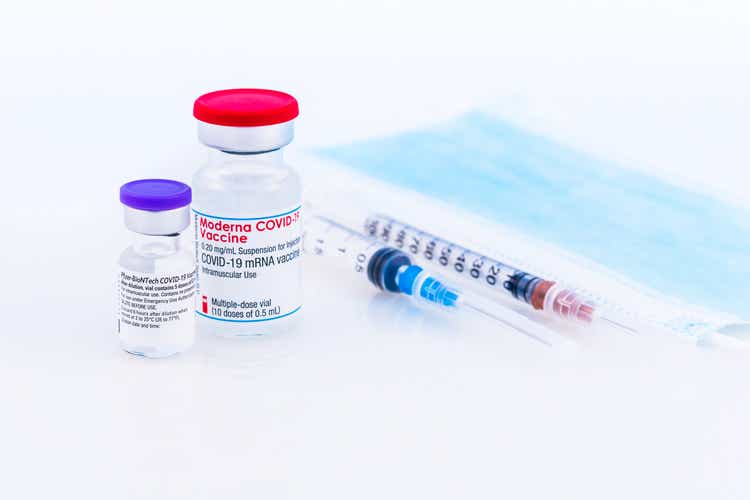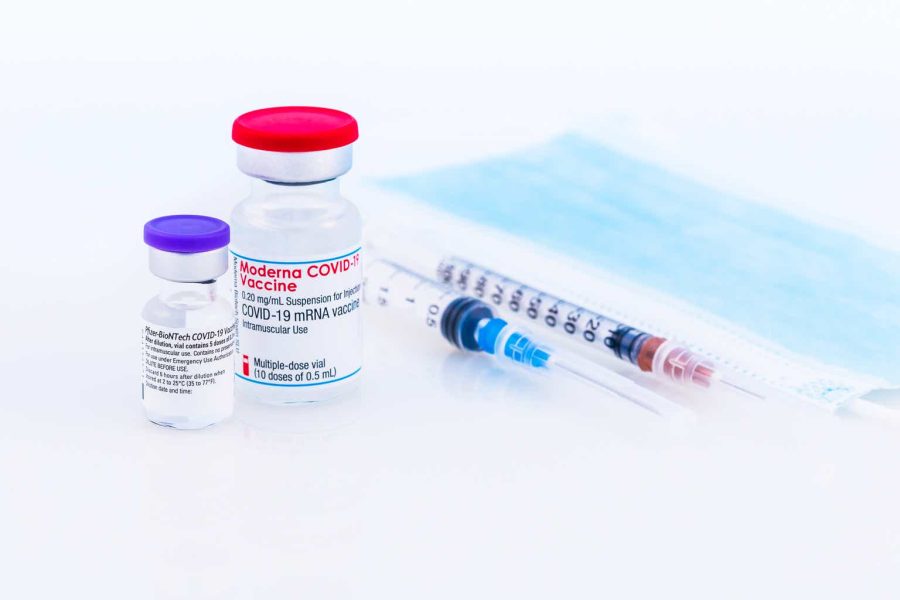Summary:
- BioNTech shares surged 13% after Summit Therapeutics reported positive data on ivonescimab, a bispecific antibody similar to BioNTech’s PM8002.
- BioNTech’s PM8002 antibody is similar to Summit’s ivonescimab.
- Despite declining Covid-19 vaccine revenue and safety concerns about those shot, BioNTech’s low valuation and promising pipeline make it a buy for risk-tolerant, long-term investors.
- BNTX stock’s forward P/E ratio is 1.87, significantly below the sector average, highlighting its attractive valuation.
carmengabriela
The shares of German pharmaceutical firm BioNTech (NASDAQ:BNTX) have rallied about 13% in the last two days. The gains could have been sparked by the success of Summit Therapeutics’ (SMMT) bispecific antibody, ivonescimab, in a Phase III trial involving previously untreated patients with locally advanced or metastatic positive PD-L1 non-small cell lung cancer (NSCLC). Since BioNTech licensed a similar antibody last November from China-based biotech firm Biotheus, some investors may believe, in the wake of Summit’s news, that BioNTech’s antibody will eventually generate large amounts of revenue for the German firm.
Meanwhile, given the low valuation of BioNTech stock and the many promising, late-stage treatments that it’s developing, I view the shares as a buy for long-term, risk-tolerant investors.
Summit’s News and Its Connection to BioNTech
On Sept. 9, Summit announced that the NSCLC patients who took ivonescimab in the Phase III trial had 49% less chance of dying or having their disease progress than similar patients who were given Merck’s (MRK) Keytruda. The latter treatment, in combination with chemotherapy, is the standard of care for NSCLC “patients who can tolerate them.” Also importantly, the 49% reduction in the chances of dying or disease progression that Ivonescimab achieved “was highly statistically significant.” However, the trial did take place in China, and the FDA will only approve treatments that have been tested globally.
Like ivonescimab, PM8002, the treatment licensed by BioNTech, is a bispecific antibody. That means that they can attach to two targets simultaneously. PM8002 binds to the PD-L1 and VEGF proteins. PD-L1 helps cancer cells elude the immune system, while VEGF can cause the growth of tumors to accelerate. Ivonescimab binds to VEGF proteins and PD-1 proteins, which are related to PD-L1 proteins.
Under the licensing deal that BioNTech made with Biotheus, BioNTech has all the rights to the antibody outside of China. The antibody is currently undergoing ” several Phase 2 and Phase 1/2 clinical trials… in various indications,” and it is being tested as a treatment for advanced NSCLC. BioNTech is slated to provide updates about PM8002’s progress at the European Society for Molecular Oncology which will be held from Sept 13 to Sept. 17.
Given the tremendous success of Summit’s ivonescimab in a late-stage trial, I believe that the outlook of BNTX’s similar PM8002 is very promising.
BioNTech Has Several Promising “Shots on Goal”
Aside from PM8002, the company has several other promising anti-cancer antibodies. For example, in partnership with U.S. privately held firm OncoC4, BioNTech is developing gotistobart. The antibody binds to CTLA-4 cells which play a role in deterring immune cells from killing cancer cells. Gotistobart is undergoing a Phase 3 clinical trial involving patients with “metastatic, non-small cell lung cancer” whose disease had progressed on antibodies that targeted PD-1/PD-L1.
An antibody-drug combination called BNT323/DB-1303 which BioNTech is developing in collaboration with China’s Duality Biologics targets a protein known as HER2. The protein causes cancerous cells to grow too quickly. Encouragingly, the FDA granted the treatment, which demonstrated anti-tumor qualities in a Phase 1/2 study, breakthrough designation last December as a treatment for endometrial cancer. The move indicates that the agency believes that BNT323/ DB-1303 has significant potential in this area.
What’s more, BioNTech and DualityBio began a Phase 3 trial of BNT323/ DB-1303 as a treatment for certain types of metastatic breast cancer in January. And at ESMO, the German company plans to report data on a Phase 2 trial of its BNT113 mRNA immunotherapy, in combination with Keytruda, as a treatment for patients with certain types of head and neck cancers who also have the HPV virus.
BNTX Stock – Risks and Valuation
BioNTech has reported that most of its revenue this year will be driven by its Covid-19 mRNA vaccine. The company partners with Pfizer (PFE) on the drug However, many consumers may have become more cautious about mRNA vaccines due to the concerns expressed by experts about the shots’ side effects.
For example, last year, Florida’s Department of health noted that there was a 1,700% increase in the reporting of adverse events associated with vaccines during the launch of the Covid shots. Conversely, there was only a 400% increase in the number of such shots administered during the period. The department also cited a study which found that “mRNA COVID-19 vaccines were associated with an excess risk of serious adverse events, including coagulation disorders, acute cardiac injuries, Bell’s palsy, and encephalitis. “
Also noteworthy is that Robert Malone, a scientist who reportedly played a role in creating mRNA treatments, has expressed concern about the potential, long-term effects of these vaccines. BioNTech’s revenue fell 23% last quarter versus the same period a year earlier after plunging 85% year-over-year in Q1. These declines suggest that worries about the side effects of mRNA Covid vaccines may indeed be causing their utilization to drop sharply. This trend may intensify more sharply than expected going forward, causing BioNTech’s top and bottom lines to come in a great deal below analysts’ average estimates.
And over the longer term, as is the case with all experimental treatments, all or most of its treatment candidates may fail to obtain approval from regulators. Treatments that do not gain approval from regulators cannot generate revenue.
But the company’s forward enterprise value-to-sales ratio is 1.87, 48% below the sector average of 3.6. In light of the company’s favorable valuation and its many, promising drugs, I think the shares are worth buying for long-term investors at this point.
Analyst’s Disclosure: I/we have no stock, option or similar derivative position in any of the companies mentioned, and no plans to initiate any such positions within the next 72 hours. I wrote this article myself, and it expresses my own opinions. I am not receiving compensation for it (other than from Seeking Alpha). I have no business relationship with any company whose stock is mentioned in this article.
Seeking Alpha’s Disclosure: Past performance is no guarantee of future results. No recommendation or advice is being given as to whether any investment is suitable for a particular investor. Any views or opinions expressed above may not reflect those of Seeking Alpha as a whole. Seeking Alpha is not a licensed securities dealer, broker or US investment adviser or investment bank. Our analysts are third party authors that include both professional investors and individual investors who may not be licensed or certified by any institute or regulatory body.
